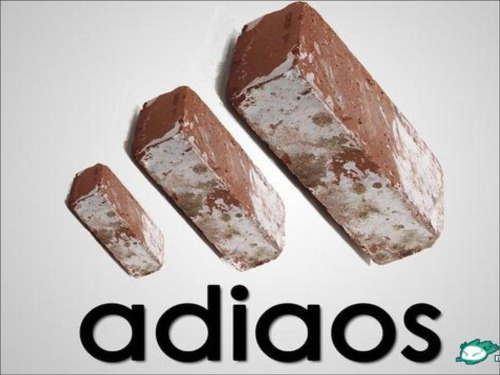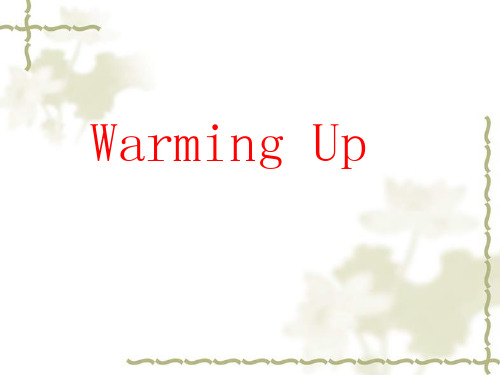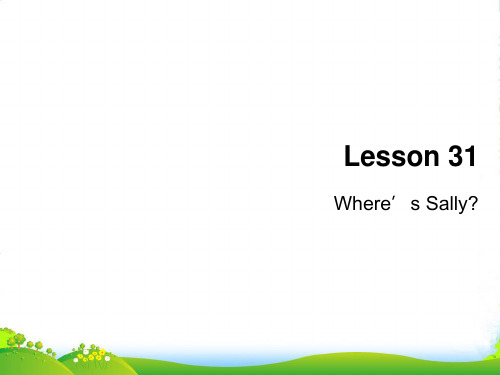新概念英语课件第31课
新概念英语Lesson31-32(共35页)课件

The man is standing .
The girl is running .
They are dancing .
Listen and Read aloud
Sentences:
----She’s sitting under the tree. He’s climbing the tree. What’s she doing? Who’s climbing the tree? It’s running across the grass. It’s running after a cat.
Revision: there be 句型:
There be 句型:
There be 句型:
Lesson 31 Where’s Sally?
New words and expressions
garden n.花园 run v.跑
under prep.在… grass n. 草,草地
How to ask the questions?
What are you doing ? What is he doing ? What is she doing ? What is it doing ?
Exercises: (,000)
read a book
(40.000)
(60,000) eat a bone
look at the picture
clean the teeth
run
walk
smile
Vocabulary
Nouns
basket letter
bone meal
cat
teeth
garden tree
Expression I beg your pardon?
新概念英语第一册第31课课件

Exercises
climb--run---
write----
sit--eat---
drink--精选ppt
play-
14
What is he doing? He is drinking water (now). Is he drinking water (now)? Yes, he is.
•Be+V-ing
精选ppt10ຫໍສະໝຸດ Tom isplayingfootbal l.
Lucy is readinga book.
Theyare watch ing TV. He is stand ing.
•V-ing
• 1.+ing: singing
• 2.不发音的e,去e+ing: take-taking
Key structures I beg your pardon?
= Pardon me? =Excuse me?
What about the dog? What about you?
精选ppt
19
精选ppt
20
此课件下载可自行编辑修改,此课件供参考! 部分内容来源于网络,如有侵权请与我联系删除!感谢你的观看!
What is she doing? She is cleaning the house. Is she doing her homework?
No, she isn’t.
What are they doing? They are running. Are they writing?
No, they aren’t.
Lesson 31 Where is Sally?
新概念英语第一册第31课

新概念英语第一册第31课Lesson 31: Success Story.In today's fast-paced world, success is often equated with wealth, fame, and status. However, the true meaning of success lies beyond these superficial markers. Success is a journey that involves perseverance, hard work, and continuous learning. Lesson 31 of New Concept English Book 1 beautifully illustrates this concept through an engaging narrative.The lesson begins with a man named John who dreams of becoming a writer. John is not wealthy, famous, or highly educated. He is an ordinary man with a passion for writing. However, this passion drives him to pursue his dream with determination and focus.John's journey to success is not easy. He faces rejection and disappointment, but he never gives up. He perseveres, learning from his mistakes and refining hiscraft. His hard work eventually pays off when he receiveshis first acceptance letter for a short story. This milestone encourages him to keep going, and his writing career slowly begins to take off.The lesson teaches us that success is not solely determined by external factors like wealth or fame. True success comes from following our passions, persevering in the face of challenges, and continuously improving ourselves. John's story is an inspiration to all of us who strive for success in our own lives.Moreover, success is not a destination; it is a journey. John's story reminds us that the road to success is often filled with obstacles and setbacks. However, it is these challenges that help us grow and learn. Each failure brings us closer to our goals, and each success is a steppingstone to even greater achievements.In conclusion, Lesson 31 of New Concept English Book 1is a powerful reminder of the true meaning of success. It teaches us that success is not about material possessionsor external validation; it is about following our passions, persevering through challenges, and continuously improving ourselves. John's story encourages us to believe in ourselves and to never give up on our dreams. As we embark on our own journeys of success, let us remember the lessons learned from John's story and apply them to our lives.。
新概念英语第三册PPT课件:NCE3_lesson31(共12页)

convention n.: generally accepted practice 被普遍接受的行为准则、常规、惯例,可受时间影响 custom 历史悠久的社会习俗,不受时间影响 practice 某团体的传统做法或令他人无法接受的习俗 tradition 传统,比custom有更悠久的历史 habit 个人习惯
eccentric a.行为举止古怪 I can't get on well with him, because he is eccentric.
disregard v. 不顾,漠视 disregard v.=ignore ,pay no attention to
in disregard of不顾,忽视,漠视
Lesson 31 A lovable eccentric
lovable=worthy of love 惹人爱的 lovely=beautiful 可爱的
eccentric n. (行为)古怪人:
strange 因为陌生而奇怪 The modern building looks strange to the villagers.
deliberately: on purpose set out to do=set about doing=start doing/to do sth.
be caught in 突然遇到,突然碰上
be caught in a heavy shower 遇到瓢泼大雨
be caught in a heavy snow 遇到大雪 be caught in a heavy storm 遇到风暴
apologetic a.道歉的
apologize to sb. He apologized to his boss. The boss apologized to his em构思的
新概念英语第三册Lesson31(共22张PPT)

variable n.(数)变量
adj.likely to change often 易变的,多变的 the variable nature of the English climate His performance has been very variable lately. variably adv.易变的 invariable adj.不变的 invariable temperature 恒温 invariably adv. 不变地
eccentric
n. (行为)古怪的人: adj.古怪的,异常的 eccentric a.行为举止古怪
I can't get on well with him, because he is eccentric. strange 因为陌生而奇怪
The modern building looks strange to the villagers.
odd 强调指出因为少见而多怪 Look, he is wearing an odd hat. peculiar 奇异的,不同寻常的 The house is peculiar. I feel peculiar today. =I feel uncomfortable/ill. =I’m not myself today. eccentricity n.怪癖
routine n.常规,惯例
the usual or normal way in which you do things daily routine 日常生活 adj. 常规的,例行的 a routine medical examination 常规身体检查 routine meetings 例行会议 routine jobs 乏味的工作 ollow the routine墨守成规 break the routine 打破常规
新概念英语第一册第31课课件(共20张PPT)

提 供 各 类 著 作的优 秀读后 感,分享 快乐! 我 非 常 喜 欢 看沈石 溪写的 动物小 说。最 近,我读 了他写 的《最 后一头 战象》 。 我 原 以 为 ,象 性格温 顺,是人 们的伙 伴,只 是普通 的动物 。不过 ,在读了 这本书 后却让 我 感 受 到 ,动 物身上 也有着 人类的 感情。 文中的 主人公 ——嘎 羧的行 为深深 的感动
What is she doing? She is cleaning the house. Is she doing her homework?
No, she isn’t.
What are they doing? They are running. Are they writing?
No, they aren’t.
野 鸡 只 有 一 步之遥 ,红豺却 没有扑 上去将 野鸡大 卸八块 ,再美美 地大
tree under
climb
run after
grass
glass
across
cat
•现在进行时
• 主语+be动词+动词现在分词
新概念英语第一册第31-32课课件

① 特殊疑问句
现在进行时 ——重点句型(一)
What are you doing?
② 肯定句
I am + v. –ing.
③ 否定句
I am not + v.-ing.
④一般疑问句
Are you + v.-ing ?
注意:当肯定句主语 为第一人称,变疑问 句时要变为第二人称
肯变疑,一变二
What are you doing? I am driving. I am not driving. Are you driving?
swim-swimming
4.以ie结尾,变ie为y再+ing,如: lie- lying tie- tying die- dying
Exercises
climb--- climbing run--- running
write--- writing play--- playing
sit--- sitting
Lesson 31 Where is Sally?
garden
tree under
climb
run after
grass
glass
across
cat
garden /`ga:dn/ n. 花园
under /`ʌndə/ prep.在…之下
tree /tri:/
n. 树
climb/klaim/
❖ e.g.
Part A.
Make the bed !(she) She is making it . ❖ Empty the basket !(he)
将祈使句改为 现在进行时
He is emptying it .
新概念1 Lesson 31 课件

grass /ɡrɑ:s/ n.草;草地
across the grass
在草地上
方位介词
on
在...上面
in
在...里面
under
在...下面
behind
在...后面
in front of 在...前面
near
在...附近
beside
在...旁边
next to 相邻
between 在...中间
what where which when who whose why how
Lesson 31 Where's Sally ?
萨莉在哪里 ?
garden /'ɡɑ:dn/
n.花园
gardening v.做园艺工作
tree /tri:/ n.树
climb /klaɪm/ v.爬;攀登
sit /sɪt/ v.坐
climb the tree
爬树
பைடு நூலகம்
climbing the tree
It's running across the grass. It's running after a cat.
She's sitting under the tree. What's she doing ?
He's climbing the tree. What's he doing ?
Tim is climbing the tree. What's Tim doing ?
Listen and answer the questions :
Where's Sally ? What's she doing ? What's Tim doing ? What's the dog doing ? Is the cat climbing the tree ?
新概念英语Lesson31-32(共17页)课件

closing coming dancing writing skating making
sitting running putting swimming jogging shopping
New words and expressions
• garden / 'ɡɑ:dn / n. 花园
• under / 'ʌndə / prep. 在……这下
Lesson 31 Where’s aying basketball. The rabbit __is__ walking. The cat __is__ listening to music.
They _a_r_e_ sleeping.
1. It __is__ dancing. 2. It _i_s__ riding a bike. 3. They _a_r_e_ skating.
She __is___ running.
It __i_s__ swimming.
They _a_r_e_ sitting under a tree.
The pig is playing basketball. The rabbit is walking. The cat is listening to music.
谢谢观赏
You made my day!
我们,还在路上……
• cat / kæ t /
n. 猫
See you
•1、书籍是朋友,虽然没有热情,但是非常忠实。2022年3月24日星期四2022/3/242022/3/242022/3/24 •2、科学的灵感,决不是坐等可以等来的。如果说,科学上的发现有什么偶然的机遇的话,那么这种‘偶然的机遇’只能给那些学有素养的人,给那些善于独 立思考的人,给那些具有锲而不舍的人。2022年3月2022/3/242022/3/242022/3/243/24/2022 •3、书籍—通过心灵观察世界的窗口.住宅里没有书,犹如房间里没有窗户。2022/3/242022/3/24March 24, 2022
新概念英语第一册31课课件

练一练
练一练
总结
现在进行时:此时此刻正在进行或发生的动作,时间 状语一般用now (现在),at the moment(此时)。
结构:主语+be +动词现在分词 He is climbing the tree.
What about the dog? What about是用来询问怎么样? What about=How about +doing sth? What about (drinking) a glass of beer?
run after:追逐
New words
run after:追
逐
What about the dog? What about是用来询问怎
么样? What about=How about
+doing sth? What about (drinking) a
glass of beer?
练一练
climbing running writing playing sitting dancing
3.New Words (新单词)
Listening
Lesson to the tape then answer the question: Is the cat climbing the tree?
现在进行时:此时此刻正 在进行或发生的动作,时 间状语一般用now (现在), at the moment(此时)。
新概念英语Lesson31-32(共48页)课件

(表示躲在树冠里,比如鸟停在树叉上,外面看上去是在树里的,不是树本 身所有的)--(人)in the tree
There are lots of apples on the tree. 树上有许多苹果 。 (是树本身所有的,比如树上结的果子,就用on )-- (树叶)on the tree
after prep.在……之后
After you. = You first, please.
run after在……之后跑,追,追逐 eg. A dog is running after a cat.
一只狗正在追逐一只猫。
across prep.横过,穿过
• 表示的是在物体表面上横着穿过 • run across 跑着横穿过 • swim across the river 横游过河 • walk across the street 横穿过街道
who pron.谁
eg. Who is there? 谁在那?
Who is your teacher? 谁是你的老师?
Who is that? 谁来了?/谁的电话?
run v.跑
run → runner(跑步的人) run → ran(过去式)
running shoes 跑鞋 run into 冲进
• 和through的区别 • through表示在物体内部穿过 • walk through the forest 走着穿过森林
cat n.猫
〈口〉小猫 kitty
eg. It rains cats and dogs. = It rains heavily. 倾盆大雨。 You’d better stay at home now, it is raining cats and
新概念英语第一册Lesson31-32WhereisSally(课件)

• type v.打字 • I am typing.
• letter n.信 • write letters • 写信 • letter字母
• basket .篮子 • in the basket在篮子里 • basketball篮球 • play basketball打篮球
• eat v.吃 • eat a cake • I am eating • have也可以表示吃 • have breakfast • have lunch • have dinner
• who /hu:/ pron.谁 • Who are you • Who is your teacher • Why • Where • When • How
• run 跑 • run with me • 跟我跑 • I am running • run fast
• grass /gra:s/ n.草,草地 • on the grass
• bone • 骨头 • lazy bones懒骨头
• clean /kli:n/ v.清洗 • clean the house 打扫房子 • clean the room
JEAN : Where7 s Sally, Jack JACK : She's in the garden, Jean. JEAN : What's she doing JACK : She's sitting under the tree. JEAN : Is Tim in the garden, too JACK : Yes, he is.
• tree /tri:/ n.树 • in the tree • on the tree(长在树上) • There are many trees along the street. • apple tree
- 1、下载文档前请自行甄别文档内容的完整性,平台不提供额外的编辑、内容补充、找答案等附加服务。
- 2、"仅部分预览"的文档,不可在线预览部分如存在完整性等问题,可反馈申请退款(可完整预览的文档不适用该条件!)。
- 3、如文档侵犯您的权益,请联系客服反馈,我们会尽快为您处理(人工客服工作时间:9:00-18:30)。
After you. = You first, please. run after在……之后跑,追,追逐 A dog is running after a cat.一只狗正在追逐一只猫。
★ across prep.横过,穿过
表示的是在物体表面上横着穿过 run across 跑着横穿过 swim across the river 横游过河 walk across the street 横穿过街道 和through的区别 through表示在物体内部穿过 walk through the forest 走着穿过森林
you? 我喜欢爬山,你呢? Monkeys climb well.猴子善于攀登。
★ who pron.谁
Who is there? 谁在那?
Who is your teacher? 谁是你的老师?
Who is that? 谁来了?/谁的电话?
★ run v.跑
run-runner(跑步的人) run-ran(过去式) running shoes 跑鞋 run into 冲进
2)现阶段的一段时间正在进行或发生的动作,但 说话的此刻动作不一定正在进行着,时间状语 通常是recently ( 最近 ), these days ( 这些日 子 )。
3)在不少情况下,表示正在进行的动作的 汉语句子,并没有“正在”这样的字, 在译为英语时却必须用进行时态.
4)现在进行时后面加一个表示将来的时间 短语,比如tomorrow, soon 等等,就 可以表示将来的一种打算。
好吗? What about another cake? 再吃块蛋糕好吗? What about the TV play? 那个电视剧怎么样?
2. 询问天气或身体等情况。例如:
What about the weather in your hometown? 你们家乡的气候如何?
How about your uncle now? 你叔叔近来身体好 吗?
刘翔跑得很快。 Liuxiang runs fast.(变成现在进行时)
★ run
vt. 经营,管理(跑生意,跑买卖) run the business 经营生意。 He runs a school. 他经营着一所学校。
★ grass n.草,草地
keep off the grass 勿践踏草地 run across the grass 跑过草地 on the grass 在草地上
2、现阶段的一段时间正在进行或发生的动作, 但说话的此刻动作不一定正在进行着,时间状 语通常是recently ( 最近 ), these days ( 这些 日子 )。
① 我最近在学校学英语。
I am studying English at a school recently. ② 这段时间他在忙着做计划。
① 你进步的很快。 You’re making rapid progress. ② 我们想在这里建一所大坝。
We’re thinking of building a dam here. ③ It’s blowing hard. 风挺大。 ④ 有人找你接电话。
Someone is asking for you on the phone.
He is making the plan these days. ③ 他们正在做准备工作。
They are making preparations for it.
这些天我们正在农场摘苹果。 We are picking apples on a farm these days.
3、在不少情况下,表示正在进行的动作的汉 语句子,并没有“正在”这样的字,在译为 英语时却必须用进行时态.
3. 寒暄时用作承接上下文的转折语。例如: I am from Beijing. What about you? 我是北京
人,你呢?
What is Sally doing? / Tim doing? / What are they doing?
Are they climbing the tree? Is she sitting under the tree? The dog is / isn’t running after the cat. Is the dog running after the cat? Yes, it is. / No, it isn’t.
★ climb v. 爬,攀登
m是鼻音,而b是爆破音,爆破音失去爆破。 climb the hill 爬山 climb the tree 爬树 Don’t climb the tree.不要爬树。 I like climbing the mountain, what about
⑤ The work is going fairly smoothly. 工作进行得相当顺利。 ⑥ Who are you waiting for? 你在等谁?
4、现在进行时后面加一个表示将来的时间状语, 比如tomorrow, soon 等等,可以表示将来的一 种打算。
I am seeing my friend this afternoon. 我打算今天下午去看我的朋友。
Lesson 31 Where’s Sally?萨莉在哪里?
New words and expressions 生词和短语
garden n. 花园 under prep. 在……之下 tree n. 树 climb v. 爬,攀登 who pron. 谁 run v. 跑 grass n. 草,草地 after prep. 在……之后 across prep. 横过,穿过 cat n. 猫
1、此时此刻正在进行或发生的动作,时间 状语一般用now (现在),at the moment (此时)。
① 简正在看电影。 Jane is watching a movie now. ② 吉姆正在打篮球。 Jim is playing basketball now. ③ 汤姆正在做家庭作业。 Tom is doing homework at the moment.
Tim isn’t in the garden, either.
He’s climbing the tree. 针对he提问。
I beg your pardon? Who is climbing the tree?
Who’s climbing the tree?
★ Text
Tim is. What about the dog? The dog’s in the garden, too. It’s running across the grass. It’s running after a cat.
★ Text
Where’s Sally, Jack? She’s in the garden, Jean.
What’s she doing?
She’s sitting under the tree.
Is Tim in the garden, too? 将此句变成否定句。
Yes, he is.
What about = How about
What about … 和 how about … 是英语口语中 常用的两个省略句型,它们的意思和用法基本相 同,常常用在以下场合。例如:
1. 向对方提出建议或请求。例如: How about going out for a walk? 出去散散步
注意!
不是所有动词都能用现在进行时态的,如: see、like、want、know 等动词往往都不用
进行时态.
现在进行时的基本结构:
S. + be + V.-ing S. + be + not + V.-ing Be + S. +v.-ing? Yes, S. + be / No, S. + be + not What + be + S. + v.-ing
He is dying. 他奄奄一息,快要不行了。 I am leaving. 我要走了。 Coming. = I’m coming. 有人敲门时,屋内的人常
回应I’m coming,意思是马上去开门,请稍等,口语 中省去了I’m。 come in. come on in. 请进。 Tom is coming here next week.汤姆下周要来这儿。 They are going to Shanghai this Friday.他们这个 星期主要去上海。
★ cat n.猫(〈口〉小猫 kitty)
It rains cats and dogs. = It rains heavily.倾盆 大雨。 You’d better stay at home now, it is raining cats and dogs outside.你现在最好呆在家, 外面倾盆大雨. like a cat on hot bricks 热锅上的蚂蚁
★garden n.花园
garden(自家花园) park 公园(公共地方)
There is a garden behind the house.房子后 面有一个花园 garden centre 花卉中心 garden city 花园城市
garden → gardening(园艺)
bank → banking(银行业)
under the tree 在树下 climb the tree 爬树
an apple tree 一颗苹果树 a family tree 家谱
